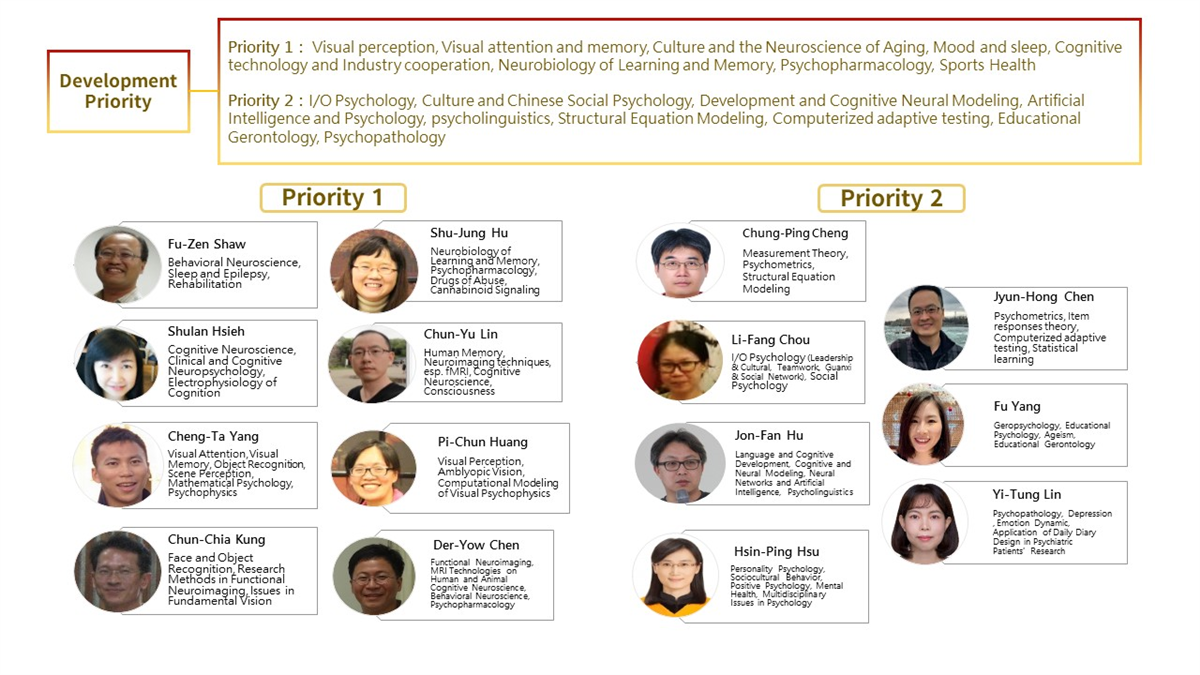At present the Department is working to create an appropriate academic and research environment for its students to implement theoretical construction and verification on the five theme tracks of sensation and perception, attention and consciousness, learning and memory, language and development, and judgment and decision-making. It aims to fulfill its educational objective of allowing students to apply what they have learned to meet their practical needs through the implementation process. Meanwhile two priorities have been set for the Department in its current stage of development:
Priority One: Brain and Cognitive Neuroscience The brain exists not simply as a basic physical organ for human beings to control all their thinking functions, cognitive activities and emotions. It also plays a significant role in the civilization and evolution of the human society. With advanced brain-imaging technology, psychologists are now able to observe the limits and impairments of the thinking and cognitive activities in the brain using noninvasive instruments (such as electroenecephalography and functional magnetic resonance imaging). Amid the continuing breakthroughs in the exploration of brain activity with neuroimaging techniques, many developed countries across the world have established neuroimaging laboratories staffed with a large number of scientists (psychologists, neuroscientist and clinical research associates) and research teams to enhance people’s quality of life and welfare.
In 2013, the Mind Research & Imaging Center was established at NCKU under the leadership of the Department of Psychology in line with the promotion of the Ministry of Science and Technology. It has assembled a total of 100 specialists in the disciplines of sociology, the humanities, biomedicine, imaging engineering, and statistical analysis from twenty schools in central, southern and eastern Taiwan to engage in various teaching and research activities related to the brain and cognitive neuroscience. Among them are several faculty members of the Department specializing in cognitive neuroscience who are tasked with administering office affairs in the Center and work to promote the development of research lines in cognitive neuroscience, affective neuroscience and cognitive neuroscience of aging. Meanwhile, the Department has procured a few sets of advanced brainwave measurement instruments, enabling us to cooperate with specialists from National Taiwan University, National Cheng Chi University and National Taiwan Normal University on the exploration of mechanisms underlying mental functions. Besides, the Department has administered to plan for the establishment of required and elective courses in brain science as part of its long-term effort to cultivate talented psychologists in this regard.
Priority Two: Applied Psychology Mental development is significantly connected with interpersonal interaction, contexts and cultural representations, as well as brain activity. Therefore, the exploration of brain and cognitive neuroscience should result in various real-life applications or serve practical needs in order to upgrade people’s quality of life and welfare. As such, our faculty members have worked in each of the five research tracks to explore practical applications of basic theories and relate their research into the brain and cognitive neuroscience to issues of daily life to expand the implementation and contribution of psychology to society. A number of efforts have been made to date, including cooperating with the industrial sector on the research and development of applied products, applying the knowledge of psychometrics to psychiatry, testing and diagnosis in clinical psychology, providing child development evaluations and picture-book guided reading services for community elementary schools and kindergartens, supporting an industrial talent recruitment and workplace health promotion program, and integrating cognitive technology with human factors. Amid these efforts, the Department has come to clarify and differentiate the universality and particularity of “culture” and construct knowledge and technology with Taiwanese cultural significance, enabling our faculty members and students to use their expertise in various professional fields and exert their influence on society to the most practical and substantial degrees.
In another related development, our faculty members have conducted fMRI (functional Magnetic Resonance Imaging) research to explore various issues of brain and cognitive neuroscience such as health neuroscience, social neuroscience and educational neuroscience. Meanwhile, they have used near-infrared spectroscopy (NIRS) to conduct research on issues of social neurology, including theory of mind (TOM) and sense of humor, gender and cooperative competition, and neurofeedback intervention training.
As for its academic programs, the Department has worked proactively on the establishment of various applied courses, including Cognition, Technology, and Design, Cognitive Neuroscience and Movies, Visual and Human Factors, Culture and Cognitive Neuroscience, Visual Thinking and Information Visualization Design, Health Engineering, Industrial and Organizational Psychology, and The Psychology of Art. It aims to cultivate students into talented professionals in applied psychology through its education and research.

